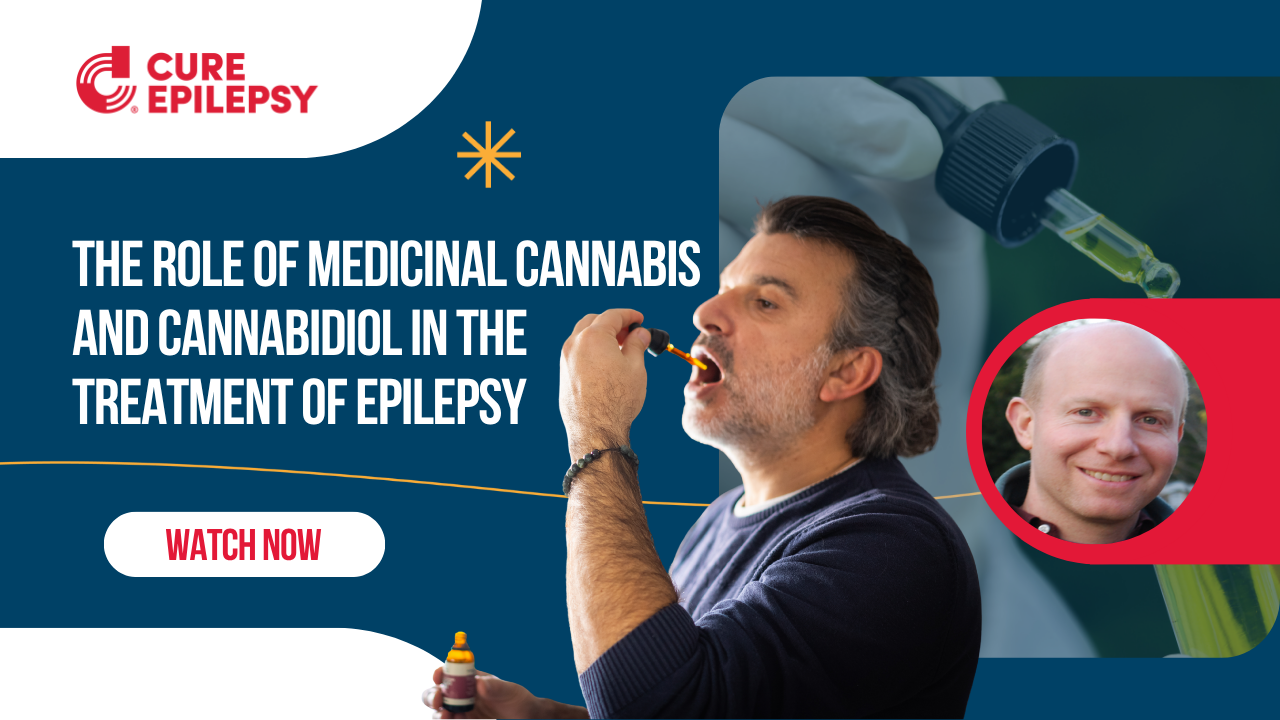Treatment-Resistant Epilepsy
Approximately 30% of epilepsy patients have epilepsy that is considered refractory, or resistant to current treatment options. Therefore, it is critical that new and improved anti-epileptic drugs be developed. Cenobamate (XCOPRI®) is an FDA-approved drug made available to patients in 2020 and is approved for the treatment of partial-onset (also referred to as “focal”) seizures. Learn what is known about how cenobamate reduces seizure activity, and why it is a safe and effective treatment of partial seizures. Also discussed are the potential side effects that patients and caregivers should be aware of when considering this treatment option.
Q&A Transcript
Is this medication suitable for occipital lobe epilepsy?
Dr. Michael Sperling: It is approved and has been studied in all of the focal epilepsies. So, if you have occipital, or parietal, or frontal, or temporal, evidence exists that it works for focal epilepsy and occipital is a focal epilepsy. Is it good for generalized epilepsy, if you have Lennox-Gastaut syndrome, for example, or Dravet syndrome? Is it good if you have an idiopathic generalized epilepsy like juvenile myoclonic epilepsy or childhood absence epilepsy, or juvenile absence, or just generalized epilepsy with tonic-clonic seizures? It has not been studied in that. Studies need to be done.
There was a similar question somebody is asking about frontal lobe epilepsy.
Dr. Michael Sperling: Frontal lobe epilepsy is a focal epilepsy, absolutely appropriate.
What other medications are good to be paired with cenobamate?
Dr. Michael Sperling: I am not a huge fan of pairing medicines. I do it more than I should, as do many doctors. But in the best of all possible worlds, you would be on only one drug because then you have less side effects. If you’re going to pair it, however, drugs that work via a similar mechanism are probably not ideal because you’re more likely to get side effects. If you take a drug that’s a sodium channel blocker already, and then a new drug is added, which also blocks sodium channels, you’re more likely to have side effects. So you have to discuss with your doctors what’s suitable for what you have. But drugs like lacosamide (brand name Vimpat), carbamazepine, which is Tegretol but basically Trileptal, and some others, like lamotrigine also (Lamictal brand name) are sodium channel blockers.
When you add cenobamate you’re more likely to get side effects. You can pair it but I routinely have people start lowering their other drugs somewhat–usually by 50 or 100 milligrams a day, depending on how much they’re taking when they’re starting–to try to block side effects. I tell them that if you start seeing side effects, you can start lowering it sooner. Drugs with a different mechanism of action–so levetiracetam (which is Keppra), brivaracetam (which is Briviact), perampanel (which is Fycompa)–they’re probably going to be a bit less likely. There haven’t been great studies on that. Some analyses have been done looking at side effects and there have been some formal studies, but that’s a general rule that one can follow. The details of the studies are almost irrelevant in some sense, because it’s the dose that you’re on that makes a difference more than anything.
You’ve mentioned felbamate and that this is possibly viewed as a newer version of felbamate, but how does the effectiveness of cenobamate compare to felbamate?
Dr. Michael Sperling: Felbamate was studied in Lennox-Gastaut syndrome. There aren’t formal studies in focal epilepsy so we can’t really compare it quite as well. Now, many people, myself included, used it in focal epilepsy somewhat, but then felbamate was discovered to cause potentially fatal liver reactions and bone marrow reactions where people became profoundly anemic within a year of its appearance. So people use it very infrequently these days and mostly it’s used in Lennox-Gastaut. So we don’t have a good idea. We all thought that felbamate was a strikingly effective agent, however.
You mentioned the issues with felbamate and liver toxicity. There is no worry about cenobamate in liver toxicity in this case?
Dr. Michael Sperling: You can do the numbers: 930 plus 1,339. We have over 2,200 people and there’s been no significant abnormalities of liver reported with this. Does that mean that a less rare or less common reaction might not happen? It’s possible. So, felbamate in the trials looked, say, for liver abnormalities also. It wasn’t until it started being prescribed that liver problems resulted.
Keep in mind that when you start a new drug that just came out, we have reasonable evidence about it being effective. We have really modest evidence about safety. There’s nothing gross and horrible, but if one person out of 5,000 has a serious liver reaction and a serious bone marrow reaction, you have to have 25,000 people get the drug before you can be reasonably confident that the rate is at least 1 in 5,000. If the rate’s 1 in 50,000, a quarter of a million people have to have it. When drugs are approved after only 2,000 and 3,000 have had it, we know the risk is not large, it’s going to be small, but it doesn’t mean that there couldn’t still be a 1 in a 1,000 or 1 in 5,000 or 1 in 10,000 reaction. Time will tell.
We don’t routinely order liver function tests when starting people on this drug. We just ask them how they feel and keep an eye on things. We don’t order any blood tests with regularity because it’s not that the blood tests really predict it. And if you have what’s known as an idiosyncratic reaction, there’s no evidence that monitoring in advance actually makes a difference. The body’s exposed to it, something happens, and whether you take it for an extra one day or seven days probably doesn’t make a difference. What’s going to be is going to be at that point. And it’s when people don’t feel well that then we have to investigate more.
In terms of metabolic pathways, does cenobamate share a pathway with CBD? We know a lot of people are on CBD, whether it’s the approved version, the FDA version, or medications or substances that are purchased at dispensaries. Is there any known interaction with CBD?
Dr. Michael Sperling: A lot of people are taking it with CBD and products that contain CBD. Medical marijuana has many chemicals, one of which is presumably CBD. The enzymes in the liver that metabolize cenobamate also will metabolize CBD and other marijuana constituent chemicals. Does cenobamate alter the metabolism of CBD? Cenobamate does inhibit one of the enzymes within the liver that helps metabolize some compounds. It’s a 2C-19 compound. There’s a potential for an effect on that. How significant is it? We don’t know, and there really haven’t been great studies in people. In all those studies that were done, there’s not a whole lot of measurement of CBD that we can know. This is one of the things that needs to be studied. I’m sure there will be data that’s out there. In fact, I wouldn’t be surprised that there’s a paper or two published addressing this that I haven’t noticed yet. In practice, we start a new drug, and if there are side effects that start to develop, it’s common to start learning about other drugs and other medications.
Again, for focal epilepsy, I would point out that there is no scientific evidence in humans that CBD has benefit. There’s no data. People can try it. I have many patients who have given it a try, so give it a try see if it helps. But there’s actually no scientific data that it works. What the effect of CBD in people with focal epilepsy who have this drug is still needs further information and a large tail cross of people. Because they’re not just on CBD, they’re on usually one or two other drugs, or sometimes three other drugs. And it’s the whole mixture of the gemisch that we need to understand that adding one more drug into the mix may not enlighten us as much as we’d like.
Do you know if there are any studies on tuberous sclerosis and cenobamate, or if there’s anything in the works?
Dr. Michael Sperling: Many seizures in tuberous sclerosis are focal. So I would expect that for focal seizures in tuberous sclerosis this will be beneficial. I don’t think there are any formal randomized controlled trials like I showed you, but I’m certain that some people in tuberous sclerosis centers are starting to use this drug and tracking how their patients are doing. I would expect that we’ll see some results relatively soon.
Are there any reactions with warfarin (Coumadin)?
Dr. Michael Sperling: None that have been significant and been reported to date. I would still be cautious in the sense of checking the INR in people on warfarin when starting any new drug that can interact with liver enzymes because you can always be unpleasantly surprised. I would hope that most of the time we would be pleasantly surprised that it shouldn’t make a difference with warfarin. But it’s one of those things we want to keep an eye on.
Do you have any recommendations for patient compliance in a digital world where there are virtual visits?
Dr. Michael Sperling: For encouraging compliance, we talk to each other and we can talk to each other through computers or phones, which is how most of my patient visits are done during the pandemic. The vast majority are done that way. I think it’s the same conversation we have. One of the things that we, as doctors, have to do is understand our patient’s motivations.
In my experience, there are three main reasons people don’t take their drugs. The most common is it bothers them. They have side effects from it so they’ll skip a dose now and then because they don’t feel well. If doctors don’t ask about that, we don’t know, and then we don’t adjust. Or you don’t tell me that you’re skipping it every now and then because it bothers you because you don’t want to disappoint me. You’re not disappointing me. I want to know if you’re having a problem; let me know and I’ll adjust your doses. We want you to feel well. The idea is to take the pill, but otherwise not notice that it’s there. In my experience, I think a lot of it has to do with the drugs causing people not to feel well. They don’t want to embarrass their doctors by making them feel bad that I gave them a drug that makes them feel bad. It’s fine. I won’t feel bad. I want you to feel well. Tell me. That’s one reason.
The second reason, unfortunately, is affordability. We live in practically the only advanced country in the world–advanced economy, I should say–advanced economy where healthcare and drugs aren’t covered and drugs can be very expensive. Insurance companies have learned that your copay can be $10 a month for the generic, and they can make it $200 a month or a $100 a month if you’re on the brand. If drugs are on brand, suddenly it’s too expensive and people wind up skipping doses or taking less than they should. So, cost makes it different. Again, have a conversation with a doctor. If it’s too expensive, you need to be on a different drug. Some of the companies have programs to provide drugs for free for people who have certain income qualifications who otherwise couldn’t afford it. We need our health system fixed where people with chronic conditions don’t have to pay money to take drugs. Right now, I have patients who are on atorvastatin (Lipitor) for cholesterol lowering. If you’re on a generic, there’s no copay at all. If you have epilepsy, you really shouldn’t have a copay. There should be no barriers. So, that’s the barrier.
The third barrier–which I’ve been guilty of too–is that every once in a while, people forget, right? We all forget. We stay up late. We were out late in the pre-pandemic world more than now, but we’re out late, we’re doing something and we go to bed and we forget our medicine. We wake up in the morning, we’re rushing, we’re late for work. We have to go somewhere. We forget our medicine.
That, you can try to do something about. I always encourage people to brush their teeth twice a day and keep your medicine with your toothbrush next to the toothbrush. It’s there in the morning, it’s there at night, if you’re doing it once a day or twice a day. Set an alarm on your phone to ring. Set two alarms. One, if you’re supposed to take your medicine at 10:00 at night, have it ring at 10:00 and then have it ring at five after 10:00 to nag you. You’ll get in the habit and then you won’t need the alarm anymore. It just becomes automatic. So there are a few techniques could be done. Most important, frankly, is to make sure that the drug doesn’t bother you.
Additional Q&A not included in webinar, but answered by our webinar expert:
What are the similarities and differences between cenobamate and felbamate? How does the effectiveness of cenobamate compare to felbamate? The risks of felbamate were not discovered until after trials. The trial numbers don’t seem particularly large to identify issues either. How can we be confident about the safety issues? Would a patient change from felbamate to cenobamate and how would one do that (e.g, taper felbamate while starting Cenobamate)?
Dr. Michael Sperling: We do not yet fully understand the differences between felbamate and cenobamate, but the drug response seems different. We will not have full information about risks of any new drug until at least 50,000 to 100,000 people have been treated with that drug. That is why brand new drugs are often best reserved for people who have not responded to at least several other medications. It is possible to consider transitioning from felbamate to cenobamate, but there is no evidence about how this would work yet as it has not been reported.
With consideration to your comment on “needing new more effective drugs,” what are the ways to increase awareness of new drug adoption by doctors as well as patients, with Xcopri as an example?
Dr. Michael Sperling: The best way to increase awareness is by offering lectures at professional meetings to educate physicians and other health care providers about new treatments. Patient education is equally important as they can ask their physicians about new medications.
Were the patients in the placebo group taking other anti-seizure medications (ASMs)? If yes, what do you think was the effect of these other ASMs? How was that controlled for?
Dr. Michael Sperling: People in the placebo group were all taking their baseline ASMs. Improvement in seizure control occurs in some patients in the placebo arm during trials, and may relate to both more careful adherence to medication regimens and positive psychological effect.
Since cenobamate alters flow of sodium into neurons, are there side effects or precautions athletes should keep in mind, such as changes to the amount or type of fluid they should drink during a workout (water, Gatorade, etc.)?
Dr. Michael Sperling: There are no established precautions for athletes. There’s no need to alter the amount of fluid or type of liquids.
Does cenobamate have any synergistic effects with any other medications?
Dr. Michael Sperling: There may be synergistic effects, but this has not been studied enough to know.
Does cenobamate have any reaction to warfarin (Coumadin)?
Dr. Michael Sperling: Cenobamate does not appear to interact with warfarin/coumadin and doses do not appear to need to be changed in the preliminary studies. However, INR should be closely monitored as these preliminary studies are limited.
How does this interact with onfi (Clobazam)? I am experiencing major side effects and wonder if a large part is withdrawal from onfi.
Dr. Michael Sperling: People taking onfi may become more sleepy and the onfi dose may need to be lowered.
Will cenobamate substitute for both Vimpat and Keppra?
Dr. Michael Sperling: Cenobamate might be substituted for either of these drugs, carefully reducing their dose after the drug is started.
Are there any drug interactions with Vimpat, Banzel or Oxtellar?
Dr. Michael Sperling: There are potential interactions with oxcarbazepine (Oxtellar). Studies are needed for rufinamide (Banzel) but there is probably no interaction. There is probably no effect on Vimpat levels.
Will doctors have information on how to dose this drug? Is there a concern about a patient who already takes four medications adding this to the regimen?
Dr. Michael Sperling: If someone is on four medications, adding a fifth is usually problematic. It is best to be on fewer drugs before trying to add in cenobamate or any other drug.
Does this work better than polypharmacy with a combination of a sodium channel blocker and GABA modulator?
Dr. Michael Sperling: This is not better with polypharmacy. It probably works as well by itself but has not been tested that way. However, there is no reason to think that it would not work well if given by itself.
Is this suitable for epilepsies for SCN1A genes?
Dr. Michael Sperling: That’s not known at this time.
Can you explain drug reaction with eosinophilia and systemic symptoms (DRESS) for the skin rash reaction?
Dr. Michael Sperling: DRESS is a serious, potentially life threatening allergic reaction with inflammation in multiple organs, rash, and fever. The chance that it will occur is reduced by starting at a low dose and gradually increasing the dose over two to three months.
Does this medication have a prescription assistance program for patients?
Dr. Michael Sperling: Yes.
I also have hypothyroidism. Is there any risk in taking this drug?
Dr. Michael Sperling: No, there’s no problem for hypothyroidism.
Can the drug level be checked in blood work?
Dr. Michael Sperling: Yes, but the therapeutic range is not well characterized, so checking the level is not terribly helpful.
What kinds of blood work or other testing is required or recommended prior to starting cenobamate? An EKG to check for long QT syndrome, for example?
Dr. Michael Sperling: No blood work is required. An EKG is not required either. It has the potential to slightly shorten the QT, so having long QT should not be an issue. If long QT syndrome is present, however, then pre-treatment and post-treatment EKG is advisable.
The information contained herein is provided for general information only and does not offer medical advice or recommendations. Individuals should not rely on this information as a substitute for consultations with qualified healthcare professionals who are familiar with individual medical conditions and needs. CURE Epilepsy strongly recommends that care and treatment decisions related to epilepsy and any other medical condition be made in consultation with a patient’s physician or other qualified healthcare professionals who are familiar with the individual’s specific health situation.










